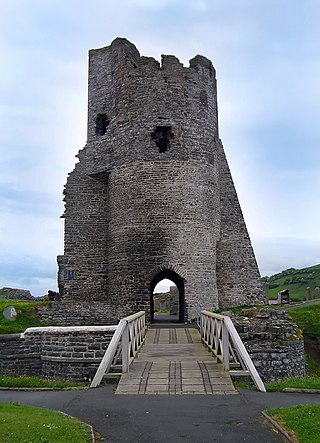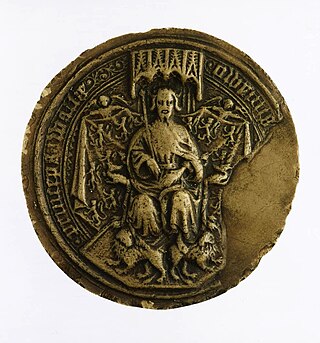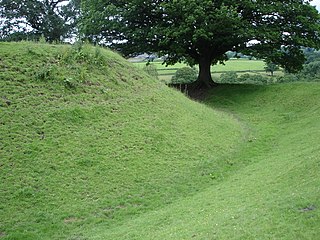
Owain ap Gruffydd, commonly known as Owain Glyndŵr or Glyn Dŵr, was a Welsh leader, soldier and military commander in the Late Middle Ages, who led a 15-year-long revolt with the aim of ending English rule in Wales. He was an educated lawyer, forming the first Welsh parliament under his rule, and was the last native-born Welshman to claim the title Prince of Wales.

Deheubarth was a regional name for the realms of south Wales, particularly as opposed to Gwynedd. It is now used as a shorthand for the various realms united under the House of Dinefwr, but that Deheubarth itself was not considered a proper kingdom on the model of Gwynedd, Powys, or Dyfed is shown by its rendering in Latin as dextralis pars or as Britonnes dexterales and not as a named land. In the oldest British writers, Deheubarth was used for all of modern Wales to distinguish it from Hen Ogledd, the northern lands whence Cunedda originated.

Merionethshire or Merioneth is one of thirteen historic counties of Wales, a vice county and a former administrative county.

Aberystwyth Castle is a Grade I listed Edwardian fortress located in Aberystwyth, Ceredigion, Mid Wales. It was built in response to the First Welsh War in the late 13th century, replacing an earlier fortress located a mile to the south. During a national uprising by Owain Glyndŵr, the Welsh captured the castle in 1404, but it was recaptured by the English four years later. In 1637 it became a Royal mint by Charles I, and produced silver shillings. The castle was slighted by Oliver Cromwell in 1649.
Robert Geraint Gruffydd FLSW FBA was a scholar of Welsh language and literature. From 1970 to 1979, he was Professor of Welsh Language and Literature at the University of Wales, Aberystwyth, and was made Emeritus Professor in 1993.

Sir Glanmor Williams was one of Wales's most eminent historians.
Sir Robert Rees Davies, was a Welsh historian.

Powys Fadog was the northern portion of the former princely realm of Powys.

Glyndyfrdwy, or sometimes Glyn Dyfrdwy, is a village in the modern county of Denbighshire, Wales. It is situated on the A5 road halfway between Corwen and Llangollen in the Dee Valley.

Wales in the Late Middle Ages spanned the years 1282–1542, beginning with conquest and ending in union. Those years covered the period involving the closure of Welsh medieval royal houses during the late 13th century, and Wales' final ruler of the House of Aberffraw, the Welsh Prince Llywelyn II, also the era of the House of Plantagenet from England, specifically the male line descendants of Geoffrey Plantagenet, Count of Anjou as an ancestor of one of the Angevin kings of England who would go on to form the House of Tudor from England and Wales.

Ynysymaengwyn was a gentry house in the parish of Tywyn, Gwynedd, situated near the left bank of the River Dysynni. The name means 'the white stone island'.
Margaret Hanmer, sometimes known by her Welsh name of Marred ferch Dafydd, was the wife of Owain Glyndŵr.

The Glyndŵr rebellion was a Welsh rebellion led by Owain Glyndŵr against the Kingdom of England during the Late Middle Ages. During the rebellion's height between 1403 and 1406, Owain exercised control over the majority of Wales after capturing several of the most powerful English castles in the country, and formed a national parliament at Machynlleth. The revolt was the last major manifestation of a Welsh independence before the annexation of Wales into England in 1543.

Peredur Ionor Lynch, FLSW is a Welsh academic who serves as professor of Welsh & Medieval Literature in the School of Welsh and Celtic Studies at Bangor University.

Edmund (Edmwnd) Prys was a Welsh clergyman and poet, best known for Welsh metrical translations of the Psalms in his Salmau Cân.

"Owain Glyndŵr's Court", also known as "Sycharth" or "The Court of Owain Glyndŵr at Sycharth", is a cywydd by the Welsh bard Iolo Goch. It describes and celebrates the hall and household of his patron, the nobleman Owain Glyndŵr, at Sycharth in Powys. It cannot be dated exactly, but was probably written about 1390, before Glyndŵr's revolt against the English crown. It survives in as many as 24 manuscripts.

A series of Welsh rebellions broke out in the century following the conquest of Wales by Edward I in 1283, which had brought the whole of Wales under the control of the Kingdom of England for the first time. In 1400, Welsh discontent with English rule in Wales culminated in the Welsh Revolt, a major uprising led by Owain Glyndŵr, who achieved de facto control over much of the country in the following years. The rebellion petered out after 1409, and after complete English control was restored in 1415 no further major rebellions occurred.

There are multiple buildings and sites associated with Owain Glyndwr in Wales.
Wiliam Llŷn was a Welsh-language poet whose work largely consists of elegies and praise-poems. He is considered the last major Welsh poet of the bardic tradition, comparable to the greatest late-medieval Welsh poets, and has been called Wales's supreme elegist. Two of his poems are included in The Oxford Book of Welsh Verse.














